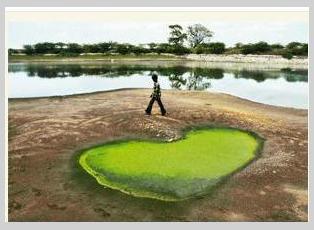India: Environmental Damage Caused by Western Pharmaceutical Companies
Companies Preaching Corporate Responsibility Must Recognise Outsourced Supply Chain Issues

Earlier concern about the activities of India’s pharmaceutical industry is now being directed to Western companies whose suppliers are polluting water in Andhra Pradesh and Telangana.
Investors are increasingly concerned about the rising number of suspensions, investigations and warnings that pharmaceutical companies are receiving from the US and European authorities.
In 2009, the pollution control board of Andhra Pradesh asked SMS Pharmaceuticals Ltd to shut the Patancheru plant after protests by local activists. The shutdown followed the announcement by the Prime Minister’s Office of a probe into the results of a Swedish study that found supposedly treated waste water in the area (right) contained a cocktail of 21 different active pharmaceutical ingredients. The extremely high levels of pharmaceuticals were found in the treated waste water at a plant where about 90 drug factories dump their residues in Patancheru.
The Times of India also reports that in 2012, in line with the Supreme Court’s order, the pollution control board of Andhra Pradesh had ordered the closure of 12 manufacturing units of different Indian pharma companies, including Aurobindo Pharma, around the city for allegedly violating pollution norms, but later rescinded this.
 Today, the Financial Times (UK) and Bloomberg report that Nordea Investment Management (headquarters in Sweden), a $240bn investment house which is operated by Nordea Financial Services, have accused large Western pharmaceutical companies of ignoring the “disturbing” environmental damage caused by the manufacturing they outsource to India. It is alleged that these drug manufacturers, supplying many of the world’s largest pharmaceutical companies, are causing water pollution leading to skin diseases and killing fish.
Today, the Financial Times (UK) and Bloomberg report that Nordea Investment Management (headquarters in Sweden), a $240bn investment house which is operated by Nordea Financial Services, have accused large Western pharmaceutical companies of ignoring the “disturbing” environmental damage caused by the manufacturing they outsource to India. It is alleged that these drug manufacturers, supplying many of the world’s largest pharmaceutical companies, are causing water pollution leading to skin diseases and killing fish.
Nordea made a field trip to the Indian states of Telangana and Andhra Pradesh in April, where it said it found “disturbing evidence of poor wastewater management related to pharmaceutical manufacturing and the effect this can have on the surrounding environment and community”.
The pollution control board of Andhra Pradesh did not respond to a request for comment.
Asset manager Nordea last week wrote to the world’s 25 largest drug companies to demand that they ensure their suppliers have adequate systems in place regarding “waste, wastewater or emissions associated with production of bulk drugs”. Noting that AstraZeneca and Pfizer and others are not aware of the seriousness of this pollution (Sasja Beslik, Nordea’s head of corporate governance), Nordea wants feedback by August from other companies it has contacted, which include Sanofi, Novartis, AbbVie and Roche.
Helena Vines-Fiestas, head of sustainability research at the asset management arm of BNP Paribas, said: “Increasingly investors are concerned about the rising number of suspensions, investigations and warnings that pharmaceutical companies are receiving from the US and European authorities
 In 2007, Nordea signed up to the Principles for Responsible Investment, a network of investors in partnership with UNEP Finance Initiative and UN Global Compact. PRI, which aims to promote responsible ownership practices, says that companies and their investors need to scrutinise these issues more carefully.
In 2007, Nordea signed up to the Principles for Responsible Investment, a network of investors in partnership with UNEP Finance Initiative and UN Global Compact. PRI, which aims to promote responsible ownership practices, says that companies and their investors need to scrutinise these issues more carefully.
However – prompted by the worldwide outcry – international investors have begun to pay more attention to supply-chain risks after the collapse of the Bangladeshi garment factory, which supplied retailers such as Primark and Benetton, killing more than 1,100 people in 2013. Following media coverage of this event, corporate buyers began to re-examine the conditions under which merchandise is produced.
–
Sources:
http://www.ft.com/cms/s/0/b0121282-1679-11e5-b07f-00144feabdc0.html#ixzz3dfwTmAu6
http://offshorecorporatesource.com/indian-pharma-pollution-is-a-bitter-pill/

